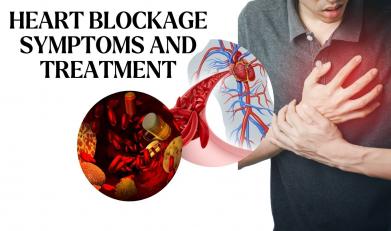

19 Jul, 2024
Heart blockage, also known as coronary artery disease (CAD), is a serious condition where the arteries that supply blood to the heart muscle become narrowed or blocked. This can lead to chest pain, heart attacks, and other cardiovascular issues. Understanding the symptoms and available treatments is crucial for managing this condition effectively.
The symptoms of heart blockage can vary depending on the severity of the condition. Common symptoms include:
Chest Pain (Angina): Often described as a pressure or tightness in the chest, angina can spread to the shoulders, arms, neck, jaw, or back.
Shortness of Breath: This can occur during physical activity or at rest.
Fatigue: Persistent tiredness or fatigue, even after minimal exertion.
Palpitations: Irregular heartbeats or the sensation of a racing heart.
Dizziness or Fainting: Due to reduced blood flow to the brain.
Sweating: Unexplained sweating, especially if it occurs alongside chest pain or discomfort.
Nausea or Indigestion: These symptoms can sometimes accompany chest pain.
Certain factors increase the risk of developing heart blockage, including:
High blood pressure
High cholesterol
Smoking
Diabetes
Obesity
Sedentary lifestyle
Family history of heart disease
If you experience any of the symptoms mentioned above, it is important to seek medical attention. Healthcare providers can diagnose heart blockage using various tests, such as:
Electrocardiogram (ECG): Measures the electrical activity of the heart.
Stress Test: Assesses how the heart functions under physical stress.
Echocardiogram: Uses ultrasound to create images of the heart.
Coronary Angiography: Involves injecting dye into the coronary arteries to visualize blockages.
Blood Tests: Check for markers that indicate heart damage.
Treatment for heart blockage focuses on relieving symptoms, slowing disease progression, and reducing the risk of complications. Options include:
Adopting a heart-healthy lifestyle is a crucial part of managing heart blockage:
Healthy Diet: Emphasize fruits, vegetables, whole grains, lean proteins, and healthy fats. Avoid trans fats, excessive salt, and sugars.
Regular Exercise: Aim for at least 150 minutes of moderate-intensity exercise per week.
Quit Smoking: Smoking cessation significantly reduces the risk of heart disease.
Weight Management: Maintain a healthy weight through diet and exercise.
Various medications can help manage heart blockage, including:
Statins: Lower cholesterol levels.
Beta-Blockers: Reduce heart rate and blood pressure.
Antiplatelet Drugs: Prevent blood clots (e.g., aspirin).
ACE Inhibitors: Lower blood pressure and reduce strain on the heart.
Nitrates: Relieve chest pain by dilating blood vessels.
In more severe cases, medical procedures may be necessary:
Angioplasty and Stenting: A catheter is used to open blocked arteries, and a stent is placed to keep them open.
Coronary Artery Bypass Grafting (CABG): A surgical procedure where a blood vessel from another part of the body is used to bypass the blocked artery.
Enhanced External Counterpulsation (EECP): A non-invasive procedure that improves blood flow to the heart.
Heart blockage is a serious condition that requires timely diagnosis and effective management. By recognizing the symptoms and seeking appropriate treatment, individuals can significantly improve their quality of life and reduce the risk of complications. Regular check-ups, a healthy lifestyle, and adherence to medical advice are key components of managing heart blockage.